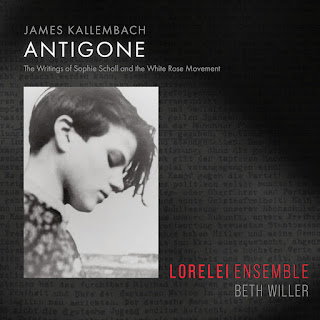James Kallembach occupies original New Music space with his Antigone: The Writings of Sophie Scholl and the White Rose Movement (New Focus Recordings FCR 33), featuring a chamber chorus of some eight female vocalists as a choral totality and then also with soloist parts, and so too with the chamber instrumental poeticisms of a cello quartet, all brought forth as a whole for this work by the Lorelei Ensemble directed by Beth Willer. They are a fine, detailed and accomplished set of performers who have a distinct feel for this music and give us spirited and exacting readings.
The work has an exploratory, declamatory tonal feel to it with close harmonies in the vocals punctuated by instrumental timbral poignancies by way of the cello quartet. It was commissioned by the Lorelei Ensemble and Carson Cooman, premiering in 2017. It gains a kind of structural backbone via the Greek play Antigone, but then focuses too on considering the writing of Sofie Scholl, a key member of the White Rose Movement--an underground resistance opposing the Nazis in the Germany of WWII, and based at the University of Munich. The work is in multiple movements, with lyrics in part culled from the anti-Nazi pamphlets distributed by the White Rose participants and then further text-song melding--Scholl's expressive texts fusing with the classicism of Antigone. It appreciates it goes without saying the courage of Ms. Scholl, who was executed by the Nazis in Germany, 1943. And at the same time it explores the lyric, poetic expressivity of her writings as a whole.
It winds introspectively, contemplatively through the vignettes from Antigone and the contrasting vocal treatment of Ms. Scholl's texts.
It is alternately tender, somber, classically retrospective and reflective gaining a timeless quality which nevertheless has a judicious contemporary feel to it and a movement away from any vestiges of Romanticism, yet nonetheless as the press sheet notes he flourishes as he seeks to consider that past within the present, particularly processual as a vivid dialog--and in so doing has an almost Classicist facticity. And that for me works well since the subject matter comes to terms with a heroic refusal that can become all the more poignant when looking upon it in insightful yet Apollonian terms.
All of that comes to bear on your listening experience, leaving you perhaps with a sort of even-handed heroics that underscores a kind of quiet resistance of the morally virtuous in time, looking back while laying out nicely, with a careful and intensive performance suchness, a thereness that rightly insists on its need to express itself.
I recommend this one for its powerful relevance to time and history as we live it. It is beautiful yet terse music, completely self-sufficient as a contemporary insistence, and leaving in the end a deep impression of alternate aesthetic reality, heroic and nonplussed moral uprightness.
If you are reading this in June 2022, the album is out on the 17th. You can preorder on Bandcamp.

No comments:
Post a Comment